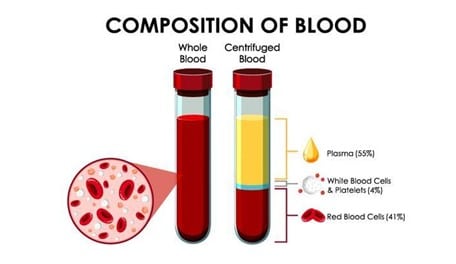What are the purposes and applications of donated plasma?

Our blood is a fluid connective tissue comprising four components: plasma, red blood cells, white blood cells, and platelets. Plasma is the yellowish liquid component of blood that remains when red blood cells, white blood cells, and platelets are removed and when clotting is prevented by adding an anticoagulant. Serum is what remains after the blood has clotted.
This article tells you about blood plasma, its functions, and its importance in medical research and public health.
What does plasma contain?
Blood Plasma is a mixture of the following components:
Water: Water forms the primary element of plasma (about 92 percent water). The water in the plasma fills up blood vessels and helps move blood and other nutrients through the heart to circulate round the body.
Proteins: Essentially, there are two important proteins in plasma: albumin and fibrinogen. Albumin is essential to maintain a fluid balance or oncotic pressure in the blood, preventing fluid from leaking into areas of the body and skin where less fluid gets collected. Fibrinogen is vital to the blood-clotting process as it helps reduce active bleeding.
Immunoglobulins: The gamma globulins present in plasma help the body stave off infections.
Electrolytes: Commonly known as salts, electrolytes such as sodium, potassium, magnesium, and calcium play a vital role in the body. When electrolyte levels are low, you can have various symptoms, including fatigue, muscle weakness, unusual heart rhythms and seizures.
What are the functions of plasma?
Blood plasma plays a crucial role in maintaining and facilitating several bodily functions. We list them below for your reference:
- Redistributing and replenishing water in the body parts which require it
- Transporting hormones, nutrients and proteins to different parts of your body
- Facilitating the oxygen and carbon dioxide exchange
- Supporting blood vessels from clogging or collapsing
- Maintaining the body’s pH balance within normal ranges to support cell function, blood pressure and volume of fluid as well as circulation
- Regulating body temperature by releasing and absorbing heat
- Removing waste from cells and diverting it to your liver, lungs and kidneys for excretion
- Clotting blood
- Preventing infections (bacterial, viral, fungal and parasitic)
- Facilitating recovery from injury
What is the importance of Plasma donations?
Plasma donations play a crucial role in treating patients who have lost a lot of blood, and in turn, plasma, either during a medical procedure or a severe accident. Given the importance of plasma in several bodily functions, a significant loss can seriously impact someone’s health.
Plasma donations can save lives when received by patients at the right time and is a great way to improve public health anywhere in the world. Therefore, medical organisations need to maintain plasma reserves in addition to whole blood.
The following medical treatments are made possible thanks to plasma donations:
Blood transfusion: Plasma is used in blood transfusions to replenish the lost fluid during trauma, surgery, or illness.
Immunoglobulin therapy: Antibodies found in plasma can be used to treat various illnesses, including infections and abnormalities of the immune system.
Blood clotting factor treatment: Plasma contains proteins that are crucial for blood clotting in clotting factor treatment. It is possible to isolate these proteins and use them to treat bleeding conditions like haemophilia.
Treating burns and shocks: Plasma can treat patients with severe burns or shock because it stabilises blood pressure and replaces lost fluids.
Research and Development: Plasma donations are used in scientific research to create novel therapies, vaccines, and diagnostic tests. Healthcare providers and labs extract the essential components of the donated plasma and condense them into various products. These products are then used to treat medical emergencies.
The proteins, antibodies and enzymes in plasma are used in therapies that treat rare chronic conditions such as autoimmune disorders. These treatments enable patients diagnosed with this disorder to live long and productive lives, which is why it is also commonly known as the “gift of life” in the medical world.
About Helvetica Health Care (HHC)
As a global supplier of medical products and services, HHC offers a range of clinical/biological samples with needed characterisation, unique material including POSITIVE HUMAN BLOOD, PLASMA and SERUM, and animal material as well as BIOPSY SAMPLES.
Thanks to our contacts, we can source material in more than 50 countries worldwide and provide access to a network of clinical laboratories, transfusion centres, reference centres and pathology laboratories. Additionally, we offer a prospective collection of samples based on the parameter required and particular specifications.
We also have access to large volumes of high-grade Human Serum, either pooled or individual, as well as negative plasma in EDTA or Citrate. Contact our office in Geneva to know more about our blood plasma and serum samples.
